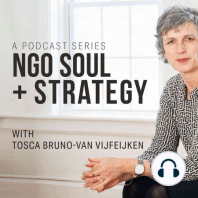59 min listen

037. We need to rethink the 'virtue narrative' surrounding NGOs: Aseem Prakash
037. We need to rethink the 'virtue narrative' surrounding NGOs: Aseem Prakash
ratings:
Length:
37 minutes
Released:
Apr 21, 2022
Format:
Podcast episode
Description
SummaryWhy might the assumptions we frequently make about the ‘virtue narrative’ that surrounds NGOs be problematic? Aren't they meant to create social good in the world?In this podcast episode, I discuss this with Aseem Prakash, a well-known academic who focuses on nonprofits as well as on environmental activism, particularly focused on climate change. Aseem wrote an article, problematizing exactly this ‘virtue narrative’ surrounding NGOs.Aseem’s Bio:Professor at the University of Washington in Seattle (USA)Founder of the University of Washington's Center for Environmental PoliticsContributor to many well-known publications, such as Forbes.com, The Conversation, Huffington Post, The Hill, and the Washington PostPh.D. at the Dept of Political Science and the School of Public and Environmental Affairs at Indiana University, USAMBA from the Indian Institute of Management in Ahmedabad, India We discuss: Academics in the past have created typologies of types of NGO failures: Agency failure: when NGOs have problems with what academics call ‘principal-agent’ issues, i.e. when the 'agent' - in this case the NGO -- is too subordinate to the 'principal' - in this case the contracting agency, donor or another provider of funds to NGOs'NGOization' failure: when managerialism and professionalism transform NGOs from citizen-agent and community-focused actors to contractors Representation failure: when the assumption that NGO activities reflect the needs of the communities they serve turns out to be not entirely to be trueCooperation failure: when the assumption that NGOs work cooperatively with each other to solve 'wicked' social, political, and economic problems turns out to be incorrect (due to competition for scarce funding resources).Given these failures, it is not healthy to assume that NGOs always do good. In other words, when NGOs are assumed to be ‘virtuous’ and this virtue narrative is held to overall tightly, it can create conditions for lapses in how NGOs' actual performance is monitored (or regulated)In addition, self-regulation by NGOs has been helpful, but probably not sufficient to weed out 'bad apples', or more important simply underperforming actors. Quotes“Do ‘global charity chains’ function like a supply chain for multinational corporations?”“When NGO agendas or advocacy stances do not represent the preferences of the underprivileged – who are already neglected by the state and markets --, NGOs may actually reproduce inequality” Resources:Aseem’s WebsiteAseem’s LinkedIn profileAseem’s recent blog posts:NGOs are great at demanding transparency. They’re not so hot at providing it.The Oxfam scandal shows that, yes, nonprofits can behave badly. So why aren’t they overseen like for-profits?Restoring the reputations of charities after scandalsAseem encouraged me in 2019 to publicize an essay in Nonprofit Policy Forum on organizational culture in NGOs and how i
Released:
Apr 21, 2022
Format:
Podcast episode
Titles in the series (74)
015. Not your usual NGO strategy process: Oxfam's recent experience with strategy formation and whether it is holding up during this massive disruption by NGO Soul + Strategy